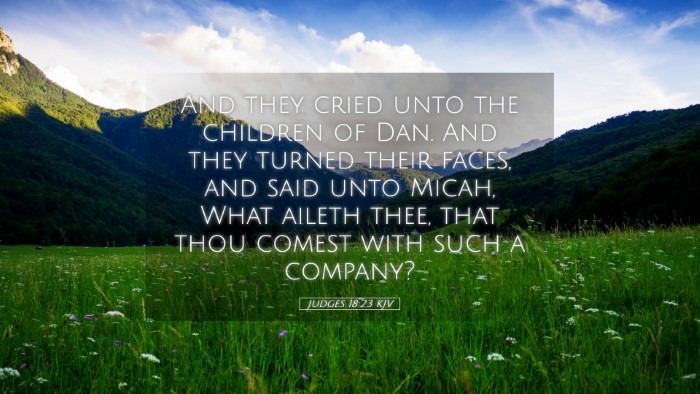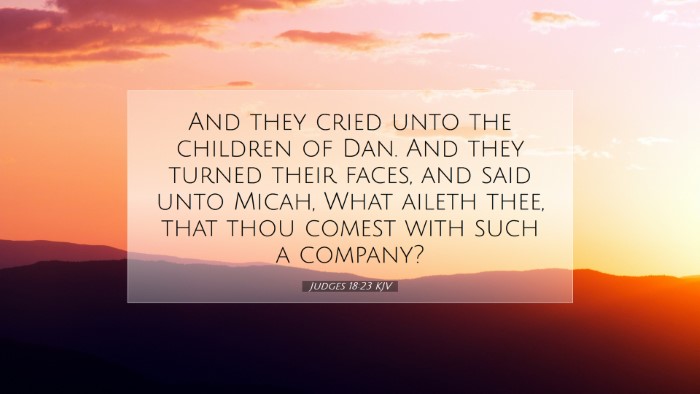Judges 18:23 Commentary
Verse Reference: Judges 18:23 - "And they shouted unto the children of Dan. And they turned their faces, and said unto Micah, What aileth thee that thou comest with such a company?"
Overview of the Context
The context of Judges 18 involves the tribe of Dan's search for a suitable place to settle, as their territory was inadequate. They sent out spies who eventually came across Micah's house, where they encountered a priest and idols. This chapter illustrates themes of idolatry, conflict, and the nature of true worship versus false practices.
Commentary Insights
Historical and Cultural Background
The passage depicts a critical moment of tension among the tribes of Israel, particularly highlighting the interplay between the Danites and Micah. Matthew Henry notes that this was a time when every man did what was right in his own eyes, which showcases Israel's drift from the covenant with God.
Verse Analysis
- “And they shouted unto the children of Dan”: This shout is marked by urgency and intention. As the Danites were coming, shouting may symbolize confrontation but also a call for attention.
- “What aileth thee that thou comest with such a company?”: Micah’s response reflects confusion and bewilderment at the sudden gathering. Adam Clarke highlights that Micah is surprised by the Danites’ approach, indicating that he recognized their superior number and perhaps feared repercussion.
Theological Implications
In Micah’s encounter with the Danites, one sees a manifested reality of how personal worship and idolatry can lead to larger communal strife. Albert Barnes mentions that Micah's collection of idols portrays a serious departure from authentic worship. This moment serves as a reminder that individual actions can have corporate consequences, especially in matters of faith.
Moral and Ethical Lessons
- Idolatry Leads to Conflict: Micah’s idolatrous practices symbolize personal failure that leads to systemic issues. The idol's presence provoked the Danites’ aggression and ambition, showcasing a failure to adhere to God’s commandments.
- The Dangers of False Stability: The prioritizing of personal desire over divine instruction creates instability. The Danites sought false assurance in their military prowess and number rather than relying on God's promise of protection.
Application for Today
For contemporary believers, this passage prompts reflection on the idols in their own lives. What personal or cultural practices may lead one away from true worship? The interactions between Micah and the Danites remind us that maintaining faithfulness to God often requires confrontation with our own practices and those around us.
Conclusion
This verse encapsulates a pivotal moment within the larger narrative of Judges, serving not only as a historical account but also rich with spiritual lessons. Pastors, students, theologians, and scholars are encouraged to consider how the dynamics of idolatry and conflict illustrated in these verses continue to resonate within the Church and society today.


